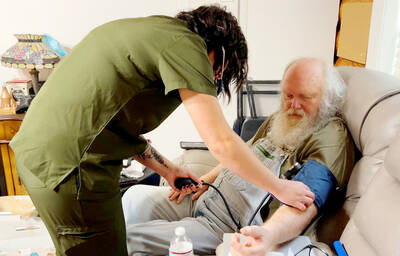The DJ Poll has been a dubious measure of popular opinion about the state of the nation's turntablists for three years now. Voting for this year's poll closes tomorrow afternoon with the final results to be announced in next week's column.
Stan (Wu from Kaohsiung) looks like the favorite so far.
The results bear all the hallmarks of the poll system, which involves mobilizing friends and supporters, and interpreting the words "fair play" very loosely. What started out as a bit of fun has changed into something a little more serious, with some pretty cut-throat tactics employed to win the title. On the one hand, it's encouraging to note just how coveted the Vinyl Word's top award seems to be. On the other, one has to wonder just whether everyone's playing nicely. And we're aware that not everyone is happy with the idea of a DJ poll. So, what's the point?

PHOTO COURTESY OF THE LOOP
To a degree, polls have something to say about the state of society, whether that be in the serious contests which decide who governs us, or the micro-slices of our day-to-day lives such as what music defines our particular generation. Polls are routinely used to gauge just what the public thinks about this war, or that law, or the other band. They can give us lists of likes and dislikes, of what's hot and what's not. But do polls actually tell us anything useful anymore? Do we really need a list of the top three gabba-punk remixes of country and western tunes? Does the DJ poll actually really tell us who is more popular? Or does it tell us who can round up more voters? It's up to you to decide that, but what a poll like this doesn't measure is the talent needed to mix, scratch, to build a set, to react to the audience's mood, or to drag even the most tired booty out onto the dance floor. If the place is bumping, that's the best barometer. Vote with your feet, and keep on dancing.
Of course, the alternative to a DJ poll or some other list so beloved of mainstream music media, is some journalist or other coming along and telling people what's good and what's rubbish, which is essentially what this column does every week. Is this any more objective than the DJ poll? Of course not. It's less objective as it's a personal opinion, though naturally it does fall within certain parameters: it's unlikely that the Vinyl Word would retain any credibility if all it pushed was cheesy Eurotrance. But it isn't actually rigged.
Looking back at 2006, some personal favorites this year have been low-key events: after-parties with just a handful of people and the sun coming up, or grooving in a basement to a jam session. They are normally the memorable ones, the loosely organized and rough-and-ready gigs which really showcase raw talent. But, that said, some of the more meticulously planned elements of the scene deserve special mention.
Innovation has been, thankfully, in abundance over the last twelve months, and this is to be praised because it is the injection of the new that stops the old getting, well, old. Collaborations between musicians and DJs have produced some interesting results, with live electronica starting to gain a toe-hold, particularly in the capital, with Viba, Moshang, and Kay and Kollette just four of an up-and-coming crowd of experimental electronic musicians.
In clubland, the rigid distinction between residents and big name guests has been blown apart by the idea of bringing big names over as residents and letting residents on as headliners, as we have seen over several months of Luxy's Sabbatical, which has proved itself to be one of the city's most ground-breaking and consistently good nights out. And we have seen the old guard of local DJs step aside and allow new talent to carve out their own niches: Scotty Baller's increasingly regular appearances are of note in this category.
The pool party sessions looked like they were going to turn into a regular, and very welcome, summer fixture in Taipei, until someone decided that it would be better to fill in the pool and sell it for development than run a public amenity. As ever, dance music faces the pressure of the bottom line. Beach parties were plentiful this year, and rather than just hoicking a sound system down to Tahsi beach and setting up (though this way of running a party remains a tried-and-tested method) promoters have been more inventive in their choice of venues, including parties at a Greek-themed beachfront restaurant and on less developed stretches of coastline.
Perhaps the most striking gripe of 2006 is the creeping spread of naff all-you-can-drink-then-let's-have-a-fight nights, which are dressed up as "ladies" nights. In some ways, they might be described as innovative, in that many of these so-called ladies' nights actually don't have any ladies there. These are the nights which threaten the music scene: club owners, particularly the smaller ones, who realize that it is easier to fill a club with braying, jeering, frat-boy morons and run cheapo schlock-fests, will be reluctant to support proper local talent. It's already happening: long confined to Wednesday nights, the listings pages are now full of these lowest-common denominator horrors all week long. A worrying trend indeed, though hopefully promoters who take risks to put on high quality entertainment — the Loop's efforts this year are worthy of mention in this regard — can stem the tide.
Honorable mentions go to www.taiwannights.com for building a strong online presence with inclusive listings, interviews and reviews and www.spunite.com for covering a vast amount of electronic happenings in Chinese.
As 2007 approaches, there are a number of options to ring in the New Year this weekend. The warm-up has to be tomorrow night's Atomic's 80s party. If it's the 80s you're after, then Marcus Aurelius spins hip-hop; Junior and Megan get into the groove with old-skool house, while G&T think that heaven is a place on earth with a blend of indie, disco and pop.
On New Year's Eve itself, every venue in town will be having a party of one description or another, and doubtless by the time this column is being read most people will have already made up their minds. However, a few choice highlights include John Askew at the Minstry of Sound, Luke Fair at Champagne 3, Kid Fresh at Party Room, Bontempi Five at 18 Lover and Luxy's end of year bash.

When Taiwan was battered by storms this summer, the only crumb of comfort I could take was knowing that some advice I’d drafted several weeks earlier had been correct. Regarding the Southern Cross-Island Highway (南橫公路), a spectacular high-elevation route connecting Taiwan’s southwest with the country’s southeast, I’d written: “The precarious existence of this road cannot be overstated; those hoping to drive or ride all the way across should have a backup plan.” As this article was going to press, the middle section of the highway, between Meishankou (梅山口) in Kaohsiung and Siangyang (向陽) in Taitung County, was still closed to outsiders

President William Lai (賴清德) has championed Taiwan as an “AI Island” — an artificial intelligence (AI) hub powering the global tech economy. But without major shifts in talent, funding and strategic direction, this vision risks becoming a static fortress: indispensable, yet immobile and vulnerable. It’s time to reframe Taiwan’s ambition. Time to move from a resource-rich AI island to an AI Armada. Why change metaphors? Because choosing the right metaphor shapes both understanding and strategy. The “AI Island” frames our national ambition as a static fortress that, while valuable, is still vulnerable and reactive. Shifting our metaphor to an “AI Armada”

US President Donald Trump may have hoped for an impromptu talk with his old friend Kim Jong-un during a recent trip to Asia, but analysts say the increasingly emboldened North Korean despot had few good reasons to join the photo-op. Trump sent repeated overtures to Kim during his barnstorming tour of Asia, saying he was “100 percent” open to a meeting and even bucking decades of US policy by conceding that North Korea was “sort of a nuclear power.” But Pyongyang kept mum on the invitation, instead firing off missiles and sending its foreign minister to Russia and Belarus, with whom it

The older you get, and the more obsessed with your health, the more it feels as if life comes down to numbers: how many more years you can expect; your lean body mass; your percentage of visceral fat; how dense your bones are; how many kilos you can squat; how long you can deadhang; how often you still do it; your levels of LDL and HDL cholesterol; your resting heart rate; your overnight blood oxygen level; how quickly you can run; how many steps you do in a day; how many hours you sleep; how fast you are shrinking; how